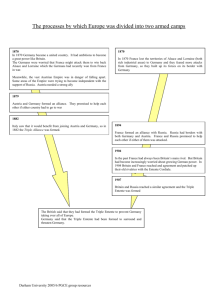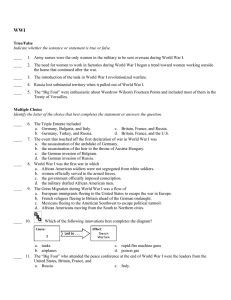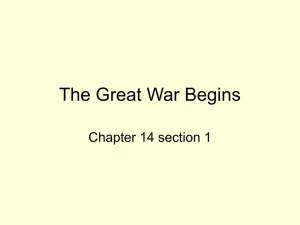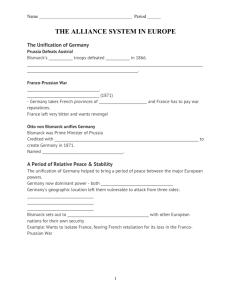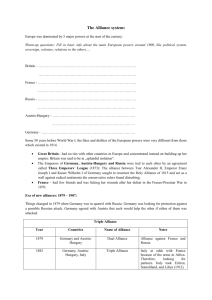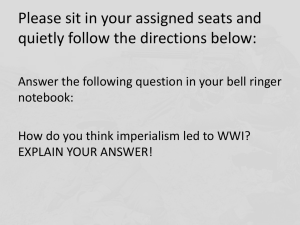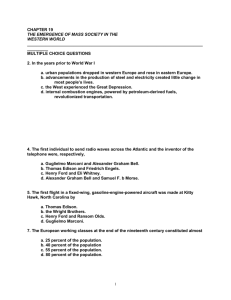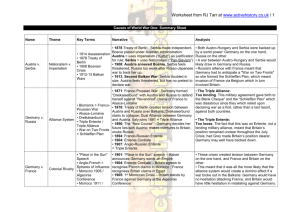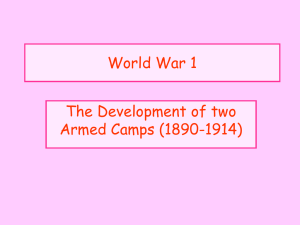world_war_i
advertisement
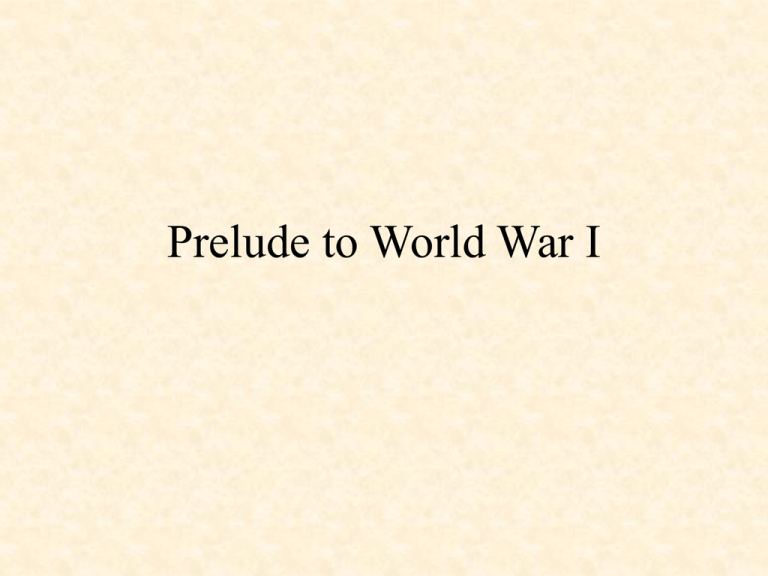
Prelude to World War I The roots to WWI can be found in the war between Prussia (a powerful German state) and France in 1870. This war resulted in a French defeat and the loss of the territory of Alsace-Lorraine to the newly created German nation. The MAIN causes of WWI can be remembered by using this simple clue: Militarism Alliances I mperialism Nationalism Militarism •Also referred to as the arms race •Creation of alliances accompanied by an armaments race. Each side believed it was essential to build their armies and stockpile weapons. This heightened the fear and suspicion. •German army --most powerful, well equipped and well trained. Based on conscription (compulsory military service). •1914--866,000 men in German army. •After mobilization--5 million + 4 million reserve. •Russians, French and Austro-Hungarians had similar system. •Britain--no conscription, relied on powerful navy. •Germany and France created war plans in preparation for war. •Germany: Schlieffen Plan France-Plan 17 THE ALLIANCE SYSTEM •-By 1870 Europe was the richest and most advanced continent. It’s people enjoyed prosperity and European power controlled vast empires. •By 1907 Europe was divided into two camps. Britain Germany AustriaHungary Italy Triple Alliance France Russia Triple Entente Triple Alliance: Germany, Austria-Hungary, Italy Key member: Germany Bismarck, the German chancellor, realized peace was necessary. To do this he wanted to isolate France and stay friendly with Britain. To avoid antagonizing Britain he refrained from building the navy or colonization. In 1882 Italy joined the Alliance. (During the war, they changed sides and joined Britain and Russia) In 1888 the new Kaiser Wilhelm II had Bismarck dismissed. The alliance with Russia collapses and Russia allies with France. Ties with Britain are weakened by naval building and the creation of a German colonial empire. Triple Entente: Britain, France and Russia Key Member: Britain Increasing concern over strength of German navy. Naval race strains relations. Britain and France resolve differences and form Entente Cordiale, 1904. 1907--Russia joins Britain and France to form Triple Entente. Imperialism •Sometimes referred to as the “grab for colonies” •by late 19th century Industrial Revolution had affected all major European nations. •Industrialists demanded that the governments should gain more colonies or “spheres of influence” for their own advantage. WHY WERE COLONIES IMPORTANT? •Source of raw material •market for manufactured goods and investment •outlet for surplus population Rivalry for colonies •strategic reasons •prestige for mother country. caused a number of crisis and hostility. Nationalism Nationalism is more than just loyalty and patriotism and can be defined as the strong identification of people with those of a nation or state. The aim of nationalist movements was the establishment of new independent states for their own racial group. In the late 19th and early 20th centuries nationalism developed into a struggle between the powers to dominate each other. Examples of Nationalism Britain: dominant in colonization. Great jealousy from France and Germany. France: humiliated in Franco-Prussian war, Wanted revenge against Germany Germany: unification upset balance of power in Europe Russia: wanted to extend power in Balkans Nationalism was potentially a powder keg that could plunge the world into major conflict. Crisis Proceeding the War A series of crisis began in 1905 eventually leading to the outbreak of war in 1914. Moroccan crisis: dispute between France and Germany over Morocco led to Algeciras Conference of 1906. This conference showed the unity of other powers against Germany. The second Moroccan crisis was the Agadir incident of 1911 which threatened to involve Britain in the quarrel and potentially start a war. Balkan crisis: Europe’s worst trouble spot. Argument over borders and independence. Concerns about growing power in Serbia. Two rival powers on borders: Russia and Austria-Hungary were suspicious of each other. The Assassination Austria-Hungary was afraid that many if her national groups would unite with Serbia, and wanted to crush Serbia in war. June 28, 1914 Austrian heir to throne, Archduke Ferdinand was assassinated while on a state visit to Bosnia. No direct evidence Serbian government involved, but Austria-Hungary saw opportunity and issued an ultimatum that Serbia rejected. War declared on July 28, 1914 with support from Germany. Russia mobilizes her army and as other powers became involved the Great war had begun.


